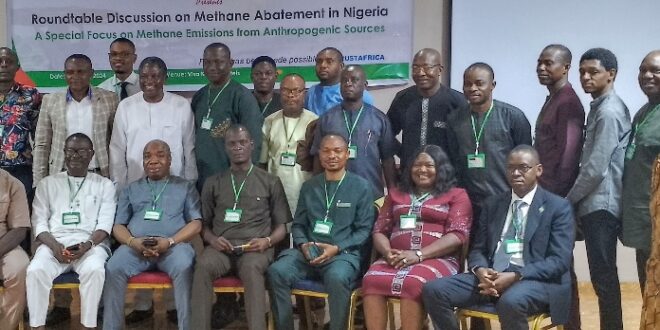By Godwin Chukwumaechi
A roundtable discussion on methane abatement was held in Port Harcourt, the Rivers State capital, Tuesday with a call for enforcement and improvement of existing policy frameworks by the government.
The call is part of the communique issued at the one-day roundtable organised by Environmental Centre for Oil Spills and Gas Flaring (ECOSGF), African Centre for Transparency Accountability and Initiative (AfriTAL), with Stakeholder Democracy Network as technical partners, in collaboration with other key CSOs. The project was funded by TrustAfrica.
The theme of the discussion was ‘Methane Abatement in Nigeria; A Special Focus on Methane Emissions from Anthropogenic Sources,’ with participants also calling for Environmental Impact Assessment before the commencement of large scale agricultural businesses.
They added that government as one of the major players should enact polices and frameworks that would help reduce what people do to stop methane emissions; emplace policies that would address innovative areas with actionable strategies that would benefit everyone in the three-tier government set up, and sensitization and enlightenment campaigns by appropriate government agencies on the imperatives of reduction of methane emissions from the local family and community levels, among many other demands.
The project stems from findings that Methane emissions from anthropogenic sources constitute about 60% of global emissions, making it imperative to highlight its critical role in temperature rise and climate change matters. Unfortunately, experts say, these emission sources tend to receive limited visibility.
In his remarks Fr. Edward Obi, national coordinator of the Environmental Centre for Oils Spills and Gas Flaring, (ECOSGF), who joined the meeting virtually, enjoined participants to pursue strategic collaborations between community stakeholders, government, and civil society organizations in addressing methane abatement and its consequences on global warming.
Mr. Adam Heal, an executive director in the Stakeholder Democracy Network (SDN) in his keynote speech provided critical insights into the dynamics of methane emissions from the oil and gas sector and progresses recorded to address the issue. He reiterated the need to carry out accurate measurement as a critical mechanism to limit methane emissions.
Some of the highlights from his address are as follows: the critical importance of methane reduction in combating global warming, improving public health, and safeguarding local environments; It underscored methane’s disproportionate impact on climate change due to its potent greenhouse capabilities despite being less abundant in the atmosphere than carbon dioxide and set the tone for a conversation on why methane reduction should be a priority, the current understanding of methane sources, and the pathways to achieving reduction that supports a just energy transition.
The address also covered the global imperative for methane reduction, citing its benefits across climate, health, and environmental spectrums; detailed the sources of methane emissions, noting the significant contribution of human activities, particularly in agriculture, energy production, and waste management; highlighted Nigeria’s specific challenges and opportunities in methane reduction, emphasizing the need for accurate data, leveraging satellite technology for emissions tracking, and the implementation of effective reduction strategies.
Additionally, the presentation touched upon Nigeria’s policy landscape, including ambitious targets for reducing methane emissions as part of its Nationally Determined Contributions (NDCs) under the Paris Agreement and involvement in international initiatives like the Global Methane Pledge.
He concluded with a call for collaborative efforts across governments, industries, communities, and individuals to address the methane challenge through innovation, policy, and community involvement, aiming for tangible environmental and public health improvements.
Speaking with journalists at the event, Dr. Ogbeifun Louis Brown, executive director, Africa Initiative for Transparency and Responsibility Leadership (AfriTAL) listed some practical steps to address methane emissions in Nigeria.
“First, many of our garbage cans are open. Many of our waste dumps are exposed within our environment, for instance. So, if we decide to do better by bagging our waste from the house level before putting it in the garbage can, then we cover it, that is within the environment.
“Secondly, at the larger scale, within the community, maybe the local government, all those baggage we expose into the landfills can we begin to ensure that we bury them properly.
“Simple things like that can help our villagers or our communities to know very well that there are things that we do to help abate methane in our environment.
Also, Nosa Aigbedion, South-South Zonal Director, National Environmental Standards and Regulations Enforcement Agency (NESREA) said; “Methane abatement is one that is of high concern to everyone. Methane is not a harmful gas at low levels, but at an elevated level, it becomes a thing of concern to everyone because of its ability to suppress oxygen and reduce what we take in as our daily life breath, which is oxygen.
“So, for that reason, there is a need for us to abate or curtail methane production and reduce its emission into the atmosphere”.
He added; “By reducing anthropogenic (human) activities that lead to methane production, we need to ensure that waste management process does not produce methane. We also need to ensure that we reduce indiscriminate dumping of waste in our dump sites. This is because sometimes methane production is very natural through the decomposition of organic materials.
“Additionally, our agricultural processes like cattle rearing which produce a lot of methane into the atmosphere either through belching or farting, releases a lot of methane into the atmosphere. It is also by burning. We want to avoid indiscriminate burning. This process releases methane which is a very high contributor to greenhouse gasses.
“So, methane is a big issue to be looked at when it comes to greenhouse gasses. Government is trying in its bid to reduce methane release, not just methane, but every gas that has deleterious effect on human health. The government is working assiduously to ensure it is reduced”
 PH Mundial – Port Harcourt Online Newspaper News Across The Region
PH Mundial – Port Harcourt Online Newspaper News Across The Region





